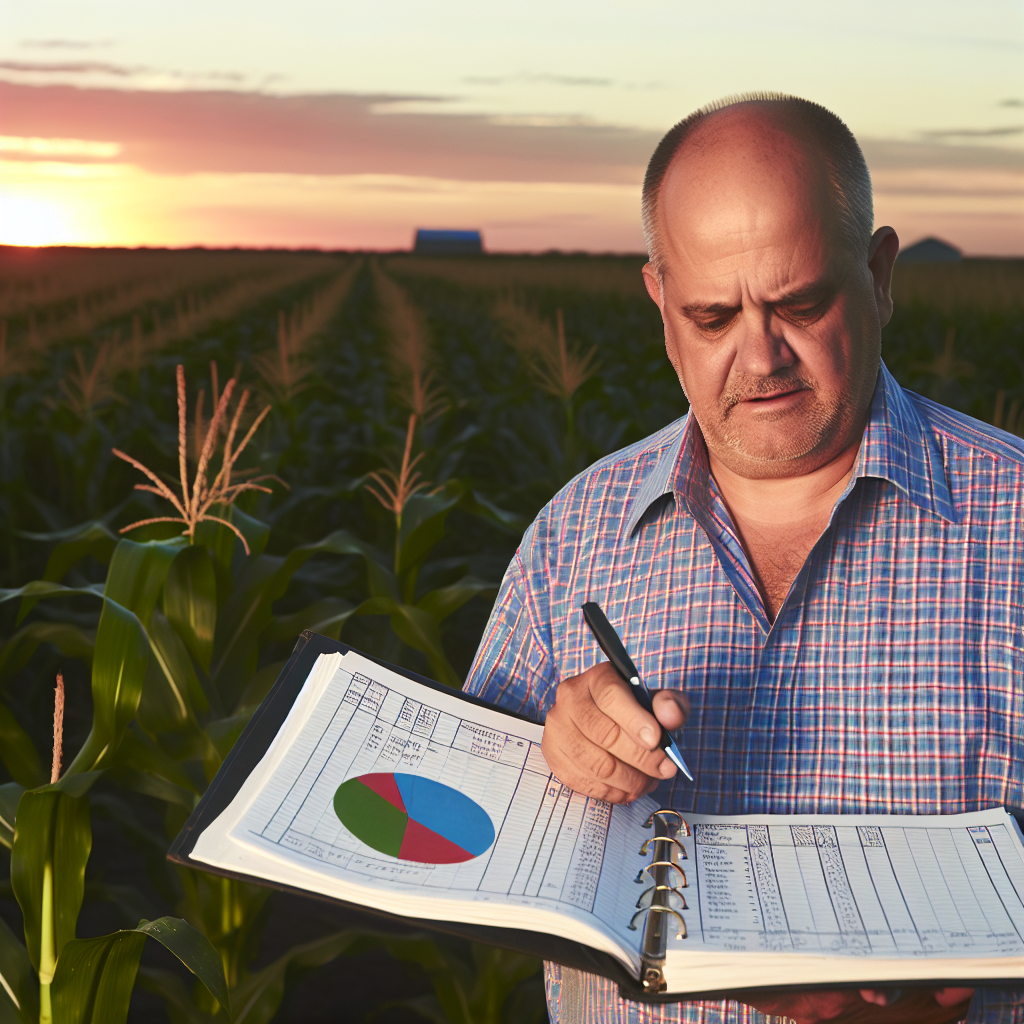Understanding Farm Taxation: Key Concepts and Terminology
Overview of Farm Taxation
Farm taxation involves a variety of tax obligations for farmers.
It includes income taxes, property taxes, and sales taxes.
Understanding these taxes helps farmers optimize their financial strategies.
Types of Taxes
Farmers face several tax types that impact their profits.
Income tax applies to profits made from farming activities.
Property tax is levied on agricultural land and buildings.
Sales tax impacts the purchase of farm supplies and equipment.
Tax Deductions and Credits
Farmers can use tax deductions to reduce taxable income.
Common deductions include expenses for seeds, fertilizers, and utilities.
Additionally, tax credits can offset tax liabilities directly.
Farmers must track all eligible expenses for accurate filings.
Filing Responsibilities
Farmers must maintain detailed records of all transactions.
This documentation simplifies the tax filing process.
Engaging a tax professional can be beneficial for complex situations.
Common Terms in Farm Taxation
Understanding tax terminology is essential for farmers.
Transform Your Agribusiness
Unlock your farm's potential with expert advice tailored to your needs. Get actionable steps that drive real results.
Get StartedGross income refers to total earnings before deductions.
Net income represents earnings after deductions are applied.
Capital gains come from selling property or assets at a profit.
Taxable income is the amount subject to taxation after deductions.
Identifying Tax Deductions for Agricultural Expenses
Understanding Eligible Expenses
Farmers can deduct a variety of agricultural expenses from their taxes.
Notably, costs associated with operating machinery and equipment are eligible.
This includes purchases, repairs, and maintenance expenses.
Additionally, farmers can deduct expenses for livestock feed and veterinary care.
Moreover, crop costs, including seeds and fertilizers, qualify for deductions.
Depreciation Deductions
Depreciation allows farmers to recover costs over time.
For instance, vehicles and buildings used for agricultural purposes are depreciable assets.
Farmers should track these assets accurately for maximum benefits.
Furthermore, specific guidelines determine how depreciation is calculated.
Consulting with a tax professional ensures proper adherence to these guidelines.
Miscellaneous Deductions
Farmers may also deduct expenses related to business travel.
In addition, meals and lodging can be deducted when traveling for business purposes.
Insurance premiums for farm-related activities are also tax-deductible.
Additionally, utility costs for operational facilities are eligible deductions.
Record-Keeping Practices
Accurate record-keeping enhances the efficiency of identifying deductions.
Farmers should maintain clear receipts and invoices for every expense incurred.
Using software for organizing financial records can streamline the process.
Furthermore, developing a structured filing system simplifies tax preparation.
Yearly audits can help ensure compliance and maximize deductions.
The Importance of Record-Keeping for Tax Optimization
Establishing Accurate Records
Accurate record-keeping is vital for tax optimization on farms.
Showcase Your Farming Business
Publish your professional farming services profile on our blog for a one-time fee of $200 and reach a dedicated audience of farmers and agribusiness owners.
Publish Your ProfileFarmers should track all income and expenses diligently.
This practice ensures they claim every eligible tax benefit.
Moreover, good records help identify potential tax deductions.
Types of Records to Maintain
Farmers should maintain various types of records.
- Sales receipts for all products sold.
- Invoices for purchases related to farm operations.
- Records of labor hours and wages paid to employees.
- Details of equipment purchases and maintenance costs.
These records support claims during tax filings.
The Benefits of Digital Documentation
Digital tools can enhance record-keeping efficiency.
Farm management software helps organize financial data easily.
In addition, digital records are often more secure and accessible.
Farmers can quickly retrieve information when needed for tax preparation.
Auditing Preparedness
Maintaining accurate records prepares farmers for audits.
Farmers should understand that audits can happen at any time.
Having comprehensive documentation reduces stress during audits.
Furthermore, it strengthens their defense against potential penalties.
Incorporating Tax Planning into Record-Keeping
Tax planning should be part of regular record-keeping practices.
Farmers can benefit from consulting tax professionals regularly.
This approach ensures compliance with changing tax laws.
Additionally, it helps them to optimize available deductions.
Uncover the Details: Organic Certification And Sustainable Farming
Leveraging Depreciation on Farming Equipment and Property
Understanding Depreciation
Depreciation represents the reduction in value of assets over time.
Farmers can utilize this concept to their financial advantage.
It allows them to spread the cost of equipment and property over several years.
This process effectively lowers taxable income and increases cash flow.
Types of Depreciable Assets
Various assets on a farm qualify for depreciation deductions.
Common categories include machinery, vehicles, and buildings.
Each asset type has its own lifespan for depreciation calculations.
Recognizing these categories is vital for maximizing tax benefits.
Methodologies for Depreciation
Farmers can choose between different depreciation methods.
The Modified Accelerated Cost Recovery System (MACRS) is widely used.
This method allows for accelerated deductions in the early years.
Alternatively, some may opt for the straight-line method.
This method spreads deductions evenly across the asset’s life.
Benefits of Timely Asset Purchases
Timing asset purchases can significantly impact depreciation benefits.
Buying equipment at the end of the tax year may yield immediate advantages.
Farmers can often take advantage of Section 179 expensing.
This provision permits up-front deductions for qualifying property.
Consulting with Tax Professionals
Understanding the intricacies of depreciation can be challenging.
Engaging a tax professional can streamline the process.
Experts can guide farmers through the complexities of tax regulations.
This support can lead to maximizing potential savings.
Documenting Assets for Compliance
Proper documentation is essential for claiming depreciation.
Showcase Your Farming Business
Publish your professional farming services profile on our blog for a one-time fee of $200 and reach a dedicated audience of farmers and agribusiness owners.
Publish Your ProfileFarmers must maintain accurate records of all assets.
This includes purchase dates, costs, and maintenance records.
Good documentation practices help ensure compliance and ease audits.
Uncover the Details: Organic Certification Process Explained
Exploring Tax Credits Specific to Agricultural Practices
Introduction to Tax Credits
Tax credits can significantly enhance farm profitability.
They reduce the amount of tax owed, directly benefiting farmers.
Understanding specific agricultural tax credits is crucial.
This knowledge allows farmers to optimize their financial strategies.
Types of Agricultural Tax Credits
Several types of tax credits apply to agricultural practices.
These include credits for conservation and renewable energy.
Farmers can also benefit from credits for livestock improvement.
Conservation Tax Credits
Conservation practices can yield substantial tax benefits.
These credits reward farmers for implementing sustainable practices.
Examples include credits for land restoration and conservation easements.
Renewable Energy Tax Credits
Investing in renewable energy can also generate tax savings.
The federal government offers credits for solar and wind energy installations.
These credits promote sustainable farming while reducing operational costs.
Eligibility for Tax Credits
Eligibility varies by credit type and specific farmer practices.
Farmers should consult IRS guidelines to maximize benefits.
Working with tax professionals can also clarify eligibility requirements.
State-Specific Credits
Many states offer additional agricultural tax credits.
These can differ significantly from federal credits.
Farmers must research local regulations to fully benefit.
Documentation Requirements
Accurate documentation is essential for claiming tax credits.
Farmers should maintain records of practices and expenses.
Proper documentation simplifies the application process for credits.
Steps to Claim Agricultural Tax Credits
Claiming these credits involves several key steps.
First, familiarize yourself with eligible credits available.
Next, gather necessary documentation and proof of eligibility.
Finally, fill out the appropriate IRS forms carefully.
Using Tax Software
Tax preparation software often includes guidance for claiming credits.
Using these tools can streamline the process and minimize errors.
Farmers should remain vigilant to ensure accurate entries.
Seeking Professional Help
Professional advice is invaluable for maximizing tax benefits.
An experienced accountant can identify all eligible credits.
This investment can lead to significant savings on taxes.
You Might Also Like: How Water Laws Affect Your Farming Practices

Utilizing Loss Carryovers to Manage Tax Liabilities
Understanding Loss Carryovers
Loss carryovers allow farmers to offset income in future tax years.
Essentially, these losses help reduce taxable income, minimizing liabilities.
This strategy is crucial for optimizing overall profitability in farming.
Showcase Your Farming Business
Publish your professional farming services profile on our blog for a one-time fee of $200 and reach a dedicated audience of farmers and agribusiness owners.
Publish Your ProfileTypes of Losses Eligible for Carryover
Farmers can carry over operating losses and certain capital losses.
Operating losses occur due to expenses exceeding income in a given year.
Likewise, capital losses arise from the sale of assets at a loss.
Understanding these types helps farmers effectively plan their tax strategies.
Benefits of Utilizing Loss Carryovers
Utilizing loss carryovers can lead to significant tax savings.
Additionally, they provide flexibility in managing income fluctuations.
Farmers can strategically time income recognition to maximize benefits.
This approach enhances cash flow management for agricultural operations.
The Process of Implementing Loss Carryovers
First, identify the years in which losses occurred.
Subsequently, determine the eligible amount for carryover.
Maintain comprehensive records to substantiate losses claimed.
Consulting with tax professionals enhances compliance and effectiveness.
Case Study: Successful Implementation
Consider a dairy farm with fluctuating milk prices.
In a challenging year, the farm reports a significant operating loss.
By strategically carryover this loss, the farmer reduces taxes in profitable years.
This strategy secures funds for reinvestment in farm improvements.
Challenges in Utilizing Loss Carryovers
Despite their benefits, loss carryovers come with challenges.
Tax laws can be complex and may change over time.
Additionally, documentation requirements can be rigorous.
Staying informed helps ensure proper utilization of this strategy.
Discover More: Fair Wages and Benefits in Farming
Crafting a Tax Strategy
Timing Sales for Maximum Benefit
Farmers can optimize profits by timing their sales strategically.
Understanding market trends helps identify the best selling periods.
Sell crops during peak demand seasons to achieve higher prices.
Monitor market conditions frequently for timely decision-making.
Additionally, consider tax implications when planning sales.
Investments and Depreciation
Investments in farm equipment can lead to significant tax deductions.
Utilizing depreciation schedules enhances tax benefits over time.
Farmers should document all equipment purchases accurately.
Consult with tax professionals to maximize depreciation strategies.
Utilizing Tax Credits and Deductions
Farmers can take advantage of various tax credits available.
Research credits for sustainable practices and energy-efficient upgrades.
Deductions for operating expenses also contribute to reduced tax burdens.
Keep thorough records of all eligible expenses for smooth filing.
Year-End Tax Planning
Year-end tax strategies can significantly affect overall profits.
Evaluate your financial position before year-end to make quick adjustments.
Consider accelerating expenses to maximize deductions for the year.
Postpone income where possible to reduce taxable income for the year.
Consult with Professionals
Engaging with agricultural tax specialists can provide valuable insights.
Tax laws and regulations are complex and frequently change.
Showcase Your Farming Business
Publish your professional farming services profile on our blog for a one-time fee of $200 and reach a dedicated audience of farmers and agribusiness owners.
Publish Your ProfileRegular consultations ensure farmers stay informed about latest tax benefits.
Professionals can offer tailored strategies to individual farming operations.
Consulting Professionals
Importance of Tax Assistance
Farmers face unique tax challenges.
Understanding these complexities can be overwhelming.
Therefore, consulting tax professionals is essential.
They offer valuable advice and insights.
This guidance can maximize your tax benefits.
When to Seek Help
It is wise to consult when tax laws change.
Changes in regulations can impact farm operations.
Additionally, consider seeking assistance during audits.
Tax professionals can help navigate these processes.
Consult when making significant financial decisions, too.
Types of Tax Professionals
Several types of tax experts can assist farmers.
C.P.A.s understand agricultural tax issues deeply.
Tax attorneys can provide legal counsel regarding disputes.
Enrolled agents specialize in representing taxpayers.
Choosing the right professional is crucial for success.
Evaluating Potential Advisors
Start with credentials and experience.
Look for professionals with a background in agriculture.
Ask for client references to gauge their effectiveness.
Also, ensure they stay current with tax regulations.
Consider their communication style as well.
Cost Considerations
Understanding the fees for tax services is important.
Some professionals charge hourly rates.
Others may work on a flat fee basis.
Get quotes from multiple advisors before deciding.
Investing in professional help can lead to savings.




